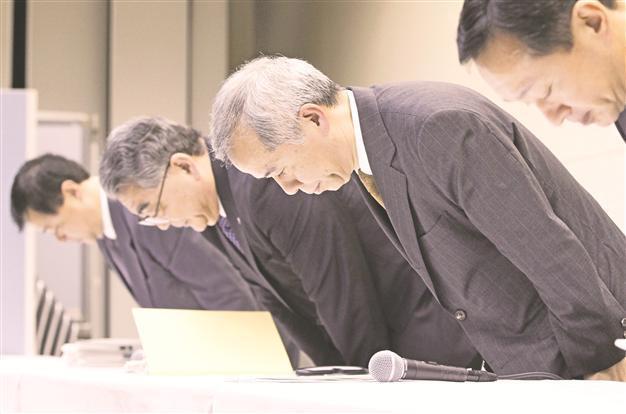Japan’s nuclear firm posts $9.76 bln full-year net loss
TOKYO - Agence France-Presse

TEPCO’s incoming President Naomi Hirose (2nd R) and outgoing president Nishizawa (2nd L) bow at yesterday’s press meeting. REUTERS photo
TEPCO, the operator of the crippled Fukushima Daiichi
nuclear plant on
Japan’s northeast coast, posted a bigger-than-expected annual loss of $9.67 billion yesterday and warned of tough times ahead.
Tokyo Electric Power said its 781-billion-yen net loss came in a year in which it was hit with massive costs to deal with reactor meltdowns, as well as increased imports of fossil fuels to make up for a nuclear power shortfall.
The net loss was worse than a previous prediction for a 708.0 billion yen shortfall and reflects an increase in projected compensation payouts to those affected by the world’s worst atomic disaster in a generation.
Revenue was 5.35 trillion yen, down from 5.37 trillion yen a year earlier.
Naomi Hirose, the company’s incoming president, warned that “unexpected situations” this summer could make its already shaky energy supply even tougher as Japan’s atomic reactors remain offline.
“Even if we have power supply to barely meet demand this summer, it doesn’t mean we will be fine,” he told a press briefing in Tokyo.
However, the embattled firm said its loss in the current fiscal year through March 2013 would come in at a much lower 100 billion yen, while sales were set to rise to 6.0 trillion yen on an expected economic pickup and rate hikes.
TEPCO’s earnings come less than a week after Japan’s government confirmed it will take a controlling stake in the firm, effectively nationalizing one of the world’s largest utilities.
Tokyo will inject one trillion yen as part of a 10-year restructuring aimed at preventing the vast regional power monopoly from going bankrupt, a plan it said would see TEPCO come under “temporary state control.”
Yesterday, the firm’s president Toshio Nishizawa said fuel costs are likely to jump this year after Japan shut down the nuclear reactors that once supplied about one-third of its electricity, following last year’s atomic crisis.
“This increase in fuel cost is based on an assumption that we will have no nuclear power in the year (to March),” Nishizawa said.
Meanwhile, Japan yesterday took a step towards becoming a nuclear nation again, when councilors in a town that hosts a power station recommended reactor restarts amid fears of a looming summer electricity crunch.
All 50 of Japan’s nuclear power plants have been switched off following routine maintenance checks carried out in the wake of last year’s tsunami.
But the town assembly of Oi, in the central prefecture of Fukui, gave the green light to the re-firing of units No. 3 and 4 at the Oi atomic power station, operated by Kansai Electric Power Co.
Mayor Shinobu Tokioka will now take the assembly’s decision into account when he consults an expert panel on whether or not to approve the restart.
